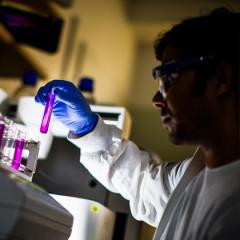AIBN’s Professor Yusuke Yamauchi has been named as a Research Project Director by the Exploratory Research for Advanced Technology (ERATO) funding program, an initiative of the Japan Science and Technology Agency (JST) that seeks to promote novel, unique, and transformative research in science and technology.

In conjunction, ERATO has awarded the equivalent of AUD 25 million to Professor Yamauchi and his colleagues to investigate how machine learning can accelerate the design and synthesis of promising new nanomaterials.
Since its founding in 1981, ERATO has earned recognition among researchers as one of the most prestigious research funds in Japan as well as overseas.
Each year, the program focuses on two or three research areas that offer high potential for creating the foundations for game-changing innovations, then appoints research directors — from academia— to be responsible for each of these strategic research areas.
Professor Yamauchi says he is extremely honoured to be named as an ERATO Research Project Director.
Previous awardees include a long list of exemplary scientists, such as Professor Ryoji Noyori who was awarded a Nobel Prize in Chemistry in 2001, as well as Professor Shuji Nakamura who was awarded a Nobel Prize in Physics in 2014. Other world-famous researchers, such as Professor Susumu Kitagawa, who discovered a series of metal-organic framework polymers, Professor Hideo Hosono, known for the discovery of iron-based superconductors, and Professor Takuzo Aida, the world’s leading scientist in supramolecular chemistry, were also ERATO Research Project Directors.
Under Professor Yamauchi’s guidance, he and his colleagues will carry out a project on two fronts – in Japan and in Australia – which aims to combine inorganic chemistry with machine learning in an effort to push the boundaries of nanomaterial design and synthesis.
Commencing in April 2021, the Japan-based project, titled "Yamauchi Materials Space-Tectonics Project in Tokyo", will be led by colleagues at Waseda University and the National Institute for Materials Science (NIMS). Concurrently, the Australian-based project will be carried out at UQ and led by Professor Alan Rowan at AIBN and Dr Shahriar Hossain at the UQ’s Faculty of Engineering, Architecture and Information Technology.
Towards big science innovation
In particular, this new ERATO project will focus on ‘space-tectonics’, which is the study of the structural properties that arise from tiny spaces in highly porous materials.

“In order to mass-produce materials synthesized on a laboratory scale for commercialization, it is necessary to optimize the properties and performance of materials by searching for the most suitable structures and compositions,” he explains.
This is tricky enough for materials such as ceramics or polymers, but porous nanostructures present a unique challenge.
Professor Yamauchi says that nano-porous materials have intriguing electrochemical properties which could make them beneficial in a variety of energy and environmental applications, but manufacturing these materials at scale for industry has been difficult because researchers must take into account how all those tiny empty spaces affect the material’s qualities, such as its conductivity or structure.
“This analysis usually requires more than 10 or 15 years,” he says. “Moreover, there is no guarantee that the materials that we have struggled to synthesize are the most suitable for the intended applications.”
There is a pressing need to accelerate the design process, but even with the help of computational chemistry methods and other analytical techniques over the past decade, there are still challenges.
“In materials science and chemistry, there is a relationship between synthesis, structure, properties and performance,” Professor Yamauchi explains.
Teasing apart these relationships can get very complicated. For example, researchers need to understand the relationship between synthesis and structure, while also understanding the correlation between composition and properties, or between properties and performance.
Professor Yamauchi says that, in recent years, machine learning has emerged as a promising way to rapidly analyse such complex relationships, especially when it comes to porous materials.
“In our ERATO project, we plan to search for new materials and hybrid materials using ‘materials informatics’,” says Professor Yamauchi.
Ultimately, they aim to create new porous ‘nanospace’ nanomaterials with potential applications in electronics and renewable energy production.
Scientific Leadership
Professor Yamauchi continues to be a superstar in Australian research. He has been selected as a Highly Cited Researcher in Chemistry in 2016, 2017, 2018, 2019 and 2020, and in Materials Science in 2020. He was also named as one of Australia’s top 40 researchers in 2019 and 2020, by the Australian’s Special Report: Research, and was one of only five scientists named in the category of Chemical and Material Sciences.
Professor Yamauchi’s ERATO project is a further example of his continued leadership in nanomaterials design as well as his ongoing leadership in strengthening research and industry collaborations between Australia and Japan.
“Professor Yamauchi is a truly exceptional scientist,” says AIBN Director, Professor Rowan. “This great recognition by the Japanese government highlights that he is seen as one of the world’s leading nanomaterial experts. I have little doubt that this research will change the world”.


